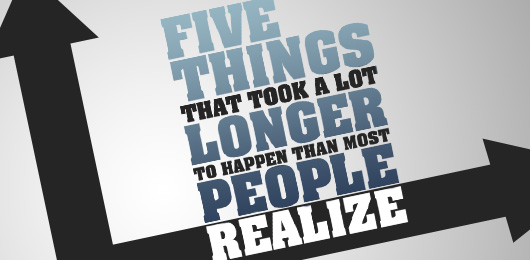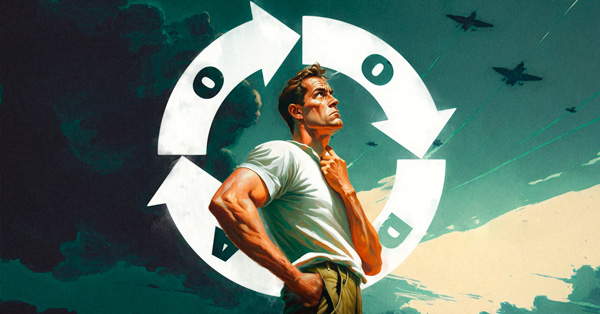Every Friday, I’m compiling a list of five things that meet one criterion. “What is that criterion,” you ask? Well, it’s going to change every week and you’re just going to have to try and keep up.
This week…
Five Things That Took a Lot Longer to Happen Than Most People Realize
When you read a textbook or watch a documentary, everything is crammed together (whether it's a few hundred pages or in 2 hours). You passively go from one section about the Black Plague to the American Revolution to the Moon Landing and upon reflection, you start to believe it all took place within the same decade.
With lesser-known figures and events, this sort of ignorance is understandable. But when it comes to some of the most profoundly formative moments in Earth/human history, too many people have slowly compromised the facts in their mind (we can probably blame The History Channel for some of that) without realizing it.
So, with the future of history at stake (that statement does make sense, I promise), let's be clear: the five items on this list took longer to happen than you probably think.

- In what year did Christopher Columbus “sail the ocean blue”?
- How long did his trip take?
Everyone knows the answer to the first question. But have you ever even investigated the second? I’m guessing not (I can’t remember ever doing so, myself). Have you ever even thought about it? Unlikely. I mean, it wasn't even in that cute limerick we learned in grade school.
I think the instinctual estimate probably sets the timeframe of his transatlantic excursion at maybe one month (I mean, seriously: current cruise trips from New York to England are less than a week in length and it’s not like the ocean’s any narrower, now). Naturally, this is wrong.
Columbus’ trip from Spain to what is now known as the Caribbean took over two months (from August 3 to October 12, 1492, it is estimated). Yikes. What's the longest car ride or plane trip you've ever been on? Can you imagine being on any sort of transport for TWO MONTHS? Jules Verne's fictional characters nearly made it around the entire planet, in that time.
As we all gleaned from the recent explosion of “every single movie is seemingly now being made in 3D” over the past year, Hollywood always seems to be eager to quickly jump on the newest, money-making bandwagon and there has been no greater innovation in the film industry than sound. (I mean sure, color picture was nice but there are still black-and-white films being made now — which was the last silent movie you saw in theaters? The first 45 minutes of Wall-E?)
Anyway, sound seems like it would be a natural concept that would instantly take over the industry. I mean, once you saw a flick with sound, could you imagine the horror of having to go back to the silence? It'd would be like when you get stuck watching a television show in standard-definition… but, y'know, a billion times worse.
So which was the first commercially released film with sound? The Jazz Singer, released in October 1927. The film (reasonably) was a huge deal, making crazy amounts of money. And yet, the “Sound Era” proper wouldn't take off for another two years. You read that right. Two years! Throughout 1927 and 1928, filmgoers — after having their ears blown away by The Jazz Singer — had precisely zero cinematic options that included sound. Oof.

Not the case. First of all, Ben Franklin was far from the first person to discover/study the subject of electricity and magnetism (there are indications that Mesopotamians had a loose, early understanding of the process). Secondly, Franklin’s kite experiment reportedly took place in 1752. Until the very end of the 19th century, electricity was as realistically attainable for the common man as magic is, at present date (hopefully that sentence will look just as ridiculous in 20 years as it does now).
Truthfully, it wasn’t until after World War I before Franklin’s kite handiwork transformed into a full-fledged utility and became available in most places in the Western World, with only the most rural of locations remaining powerless. So… that “kite plus key” story really didn’t carry any weight for about 175 years.

Well… not so much. The start of World War II is regarded to have officially begun on September 1, 1939 (the Nazis invaded Poland, France and England declared war on the Nazis – this on the heels of the continuing wars between China and Japan, as well as Ethiopia and Italy). If you missed it: “America” was not listed anywhere in there. The lingering Great Depression and a post-World War I affinity for isolationism kept the States out of the conflict from the outset (which is pretty odd, looking back – the most regarded-as-positively-evil nation in the world’s history was declaring war left and right and America was still not quite sure about whether or not they should intervene).
It wasn’t until the attacks on Pearl Harbor over two years after the war began (December 7, 1941) that the United States joined the fray, declaring war on Germany and Japan. So, the D-Day invasions were what, a few weeks later, right? Um… no. It was another two years before our grandfathers stormed those French beaches.
Don’t get a calculator, I’ll spoil the ending: nearly five full years elapsed between the beginning of World War II and the most famous American military action of the conflict. Five years. It’s not just a David Bowie song – it’s a startling part of history. America was involved in many WWII-related conflicts between 1941 and 1944 but these sort of things seem to have been overlooked in the zeitgeist of the years since.
(Another related “thing that took a lot longer to happen than most people realize”: Hitler’s rise to power. It took decades. It’s not like some mustachioed art student kicked down the door to a German executive office in 1939 and shouted “I make the rules now!” Hitler entered politics in 1919, was named Chancellor in 1933, invaded Czechoslovakia in 1938, and the Holocaust began in 1939.)
[Note: because this thing happened 65 million years ago, the details are not quite as concrete as any other entry on the list.]
Whether we blame a meteorite, volcanoes, planetary cooling, or time-traveling big game hunters for the eradication of the coolest monsters to ever walk the Earth, every living thing would definitely not be wiped out overnight (as I think we’ve all assumed, from a young age).
Though any plants and animals stuck in the direct impact zone of a rock from space would surely perish quickly, even in a world with one super-continent, the resulting ecological fallout from such an event would require a long time to render every living thing into a carcass. If the impact directly caused great geological upheaval (like volcanic eruptions), it would probably take at least a few years or decades before every single dinosaur on Earth was dead as a result.
Anyway you cut it, it was a pretty serious, long-term melodrama with lots of teeth.

















![It’s Time to Begin Again: 3 Uncomfortable Frameworks That Will Make Your New Year More Meaningful [Audio Essay + Article]](https://www.primermagazine.com/wp-content/uploads/2025/01/begin_again_feature.jpg)
